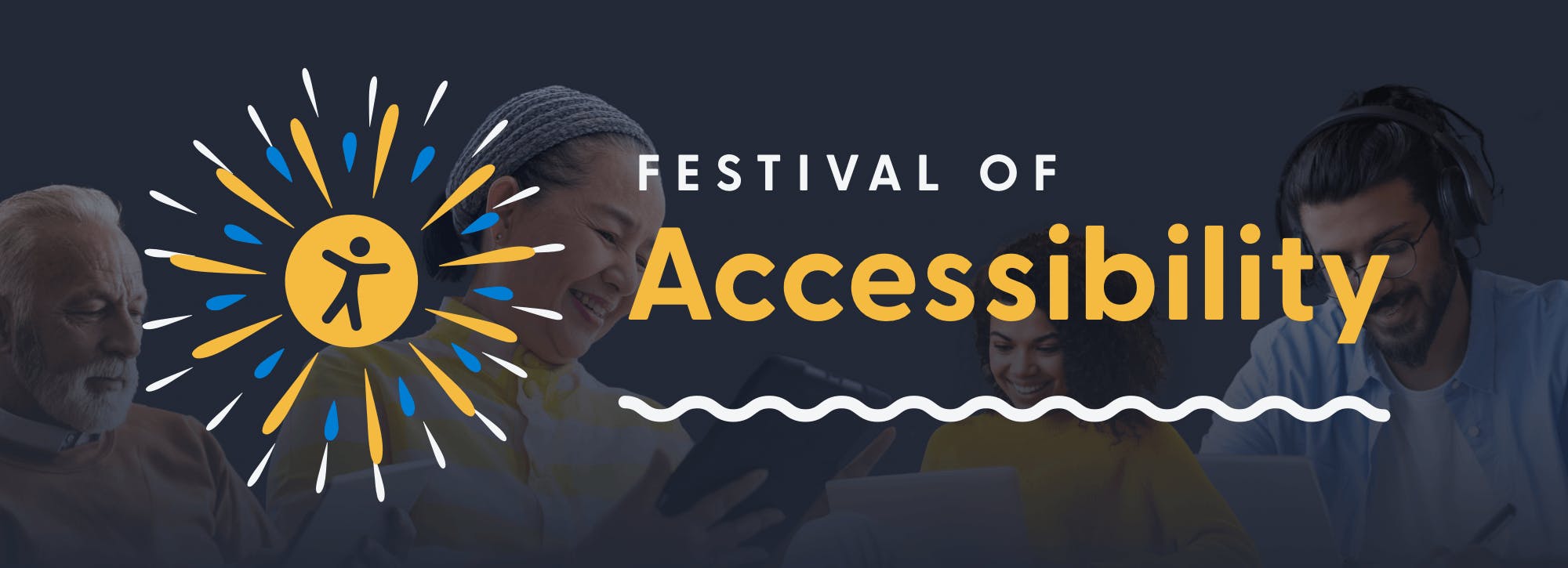We’re marking 10 years of GAAD with our first ever Festival of Accessibility
On 20th May, we’ll be partnering up with 11 organisations for our first ever Festival of Accessibility. And we’re inviting you to join us - for free.

Ten years ago, a man named Joe Devon made a plea…
“For some people, an accessible Internet literally makes a world of difference…. Although I’m a backend programmer, I’m still ashamed at how little I know....Let’s work together and fix this oversight in our knowledge. As a community, we can work together to change the world. First, let’s agree on a Global Accessibility Awareness Day.”
Today, we’re celebrating a decade of global awareness around digital accessibility. And some huge achievements in the digital space. It just goes to show how one spark can light up the path to change!
And now’s not the time to get complacent - let’s keep the light shining of digital access and inclusion.
Join us for our virtual conference on 20th May - it's free.
What to expect?
At our virtual conference you can enjoy a full day of keynotes, panel discussions, interactive sessions, and Q&As with the experts.
The agenda
9.00am - 9.15am Introduction - Driving Digital Accessibility for All
In this session, we'll kick off the day with a celebration of how far the digital space has evolved. And we’ll share insights into the part each of us can play in improving the experience of more than one billion people with disabilities.
9.15am - 10.10am Digital by Default: Baby Boomers and the impact of COVID-19
The COVID-19 pandemic has led to people using the internet more often and for more reasons. In this session discover the impact that going 'digital by default' has had on the older generation. Hear what we've learned from our recent YouGov research. And gain insights from the Centre for Ageing Better. They'll be sharing what you can do to maximise digital opportunities with the 'Boomer consumers'.
10.15am - 10.45am Accessibility, Usability, and Inclusion - what’s the difference?
Accessibility, usability, and inclusion should each be considered when designing websites, products and services. In this session explore the distinctions and overlaps between all three. Gain advice from RIDC and AbilityNet. Learn how to address each in your digital projects. And discover how best to gather feedback from your disabled audiences.
11.00am - 11.30am Writing in Plain English - the inclusion challenge
As many as 1 in 4 UK adults have very low literacy skills. And 10% have dyslexia, which can cause reading challenges. With this, it's vital to write content in a way that's simple, clear and concise. In this session hear from Plain English Ireland. Gain an overview of Plain English best practice. Explore how to write reports, guides, emails that are easy for all your audience to understand. Take part in interactive tasks and practice these new skills.
11.35am - 12.30pm Digital Literacy & Accessibility in the Public Sector
There are 14.1 million disabled people in the UK. Up to 1 million people cannot speak English well or at all. And 9 years old is the average reading age in the UK. For some, accessing essential digital communications and services isn’t easy. In this session hear how experts within the public and health sectors are working to provide more inclusive experiences for all. Speakers include Patient Information Forum and Bridgewater Community Healthcare.
1.00pm - 1.15pm How to go above and beyond, and achieve customer loyalty
Making sure your digital presence is accessible has a positive impact on brand image. And creates a welcoming experience for a wider audience. But how can you move from an inclusive brand, to a brand of choice? In this session, we'll explore how to build online inclusion into your marketing and communications strategy, in a way that demonstrates that you truly care.
1.15pm - 2.10pm Accessibility law & how to check your website for the top 5 WCAG errors
Countries around the world are addressing digital access issues through legislation. Many of the requirements are based around the Web Content Accessibility Guidelines (WCAG). In this session, gain an overview of legislation and forthcoming deadlines with AbilityNet. Discover the five most common WCAG errors, and learn how to find and fix them.
2.15pm - 2.45pm Beyond the purple pound: A real look at disability in the digital journey
About 15% of the world's population lives with some form of disability. That's one billion people - the world’s largest minority. And this figure is expected to double by 2050. In this session experts from Ruh Global and Scope will explore the impact of digital inaccessibility on the disabled population. They’ll delve into how organisations can best meet their needs. And look at the meaningful benefits that come from making programs and campaigns inclusive.
3.00pm - 3.30pm What makes content inclusive?
Content that’s inclusive is that which not only can be accessed, but also understood. Removing barriers to access and meeting WCAG’s technical requirements are all vital. But it’s just as important to make sure that the content accessed is actually usable, and makes your audience feel connected and welcomed. In this session, gain advice from Content Design London. Explore how readability, use of language, and inclusive design comes into play. Gain an overview of readability guidelines, and discover best practice around inclusive language and design.
3.35pm - 4.30pm The Future of A11Y
In this session we’ll be delving into WCAG 3.0 - when it’s coming and what will be included. We’ll also be giving you an update on accessibility legislation. And we’ll be looking at the future of AI and accessibility, including what’s coming with wearable and voice technology. Speakers include AbilityNet, The Readability Group and IAAP.
The line up
We hope you can join us for a day full of fun, facts and enlightenment for the future.
